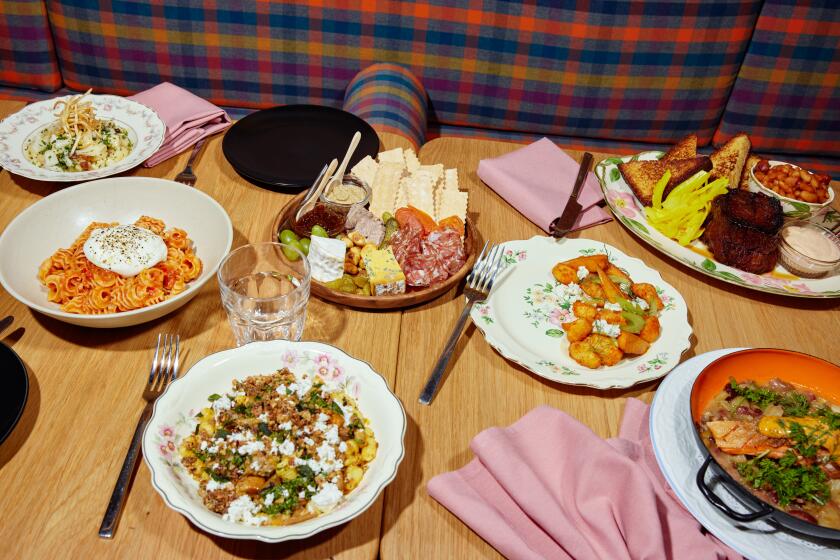<i> Au Naturel</i> Is <i> Au Courant</i> : Vegetarian Solution
- Share via
CONCRETE, Wash. — Eugene Kahn has always had a passion for pickles. His craving, however, has taken him to the eclectic reaches of cucumberdom.
For example, Kahn makes dills that are low-sodium, spicy, kosher--and organic.
Low-sodium spicy kosher organic dills are just one of the many unusual processed organic foods that Kahn, president of Cascadian Farm, oversees. The Northwest’s largest organic-food company also produces low-sodium organic sauerkraut, sorbets made from organically grown fruits, unsalted organic canned vegetables and a full line of organic frozen fruits and vegetables, including hash browns, French-style green beans and asparagus.
Here in Concrete (population about 800 and the former locale of two cement plants), a network of domestic and international organic-food sales is joined in a former bank building that looks more like a roadside restaurant.
Since 1972, Kahn and now-partner Roger Wechsler have worked to make Cascadian Farm into one of the country’s most varied processors of organic foods, many of which are sold in specialty and natural-food stores.
The company is also a prime example of how organic-food firms are becoming increasingly savvy and successful in producing and marketing their products.
What’s more, Cascadian Farm is riding a wave. Statistics from the natural-foods industry show that while sales of frozen organic foods are still small in comparison to sales of fresh organic food, frozen foods are among the industry’s top three or four faster-growing product lines.
And there is promise for more growth. Wechsler predicts that as growers experiment with new crops, there will be even more variety in organic processed foods in the next 10 years or so. Right now there are still “a lot of things you can’t find in organic,” Wechsler says.
Command central for Cascadian Farm is here in Washington state’s Skagit Valley, at the foot of the Cascade Mountains, but the firm’s tentacles reach into about a dozen states, where more than 50 farmers grow produce according to the company’s specifications. Growers are certified organic by a number of private certifying organizations.
The fruits and vegetables are then shipped to any one of more than 15 processing facilities in the country. These contract plants, which process traditional products as their mainstays, include two pickle plants, one in North Carolina.
They “must keep our product separate,” says Wechsler, explaining that the organic produce must not mingle with conventional fruits or vegetables during washing or processing.
Besides selling its products through brokers to retail establishments, Cascadian Farm sells bulk frozen produce to other organic-food companies, which in turn process the raw ingredients into their own products.
Walnut Acres, for one, purchases practically the firm’s entire line of frozen berries, such as raspberries, strawberries, boysenberries and marionberries, which Walnut Acres uses to make jams. The Pennsylvania organic mail-order company also buys fruit concentrates from Cascadian Farm and processes them into juices such as apple loganberry, apple blackberry and grape apple.
Cascadian Farm is also gaining ground in international markets, particularly Canada and Japan. According to Wechsler, there is a “growing interest in food safety in Japan,” where the company expects continued strong growth.
Pickles, jams and frozen vegetables are big sellers there, says Kahn. Fresh produce such as apples and pears, grown by domestic organic farmers, is also shipped to European countries such as Holland and England.
While Cascadian Farm, with 30 full-time staffers and a gross of about $10 million, is small potatoes compared to conventional food processors, it is increasing sales by a hefty 30% a year, according to Wechsler.
And although the two partners remain committed to retaining the original goals of the organic-foods firm, Welch’s, well-known maker of preserves and grape juice, bought a controlling interest in Cascadian Farm last year. Welch’s is owned by the National Grape Co-Operative, a group of 1,600 growers producing Concord grapes in seven states.
Kahn maintains that the purchase has greatly improved the day-to-day operation of the company. “We have the financial strength to achieve our goals,” he says. “But it hasn’t changed our goals.”
For one, Kahn says, Welch’s has “one of the most sophisticated food-technology departments in the country, working with us on product development.” Already, some of Cascadian Farm preserves have been reformulated to improve their flavor and texture.
“In order to expand beyond the core (organic) market of die-hards who are very flexible with prices, we need to bring our costs down and be more affordable to average customers,” Kahn says.
What has blossomed into an organization that sells its goods all over the world was started by Kahn almost 20 years ago. In 1970, Kahn, then 23, moved to the Northwest from Chicago to get a master’s degree in English literature at the University of Washington. His school plans were tossed aside, however, after Kahn explored the picturesque Skagit River Valley. Fed up with city living, Kahn started farming.
Trucking his produce two hours into Seattle, Kahn met Wechsler, who had recently started a food distribution company. The two joined forces, with Wechsler in charge of sales. The two became partners three years ago.
In 1980, strawberry jam, made in a small processing kitchen behind Kahn’s house to use up an overly abundant strawberry crop, became the company’s first processed product.
* Cascadian Farm has started a small mail-order business. Call (206) 853-8175 or write: Cascadian Farm, Mail Order Dept., P.O. Box 568, Concrete, Wash. 98237.
More to Read
Eat your way across L.A.
Get our weekly Tasting Notes newsletter for reviews, news and more.
You may occasionally receive promotional content from the Los Angeles Times.










